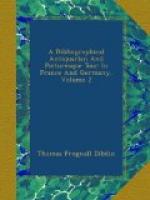In later times, Brandt, Wimphelin, Locher, Baldus, Pfeffel, and Nicolay, are enough to establish the cause of good poetry, and the celebrity of this city in the production of such poets. As to the Meister-Saengers (or Master-Singers) who composed the strains which they sang, perhaps the cities of Mentz and Nuremberg may vie with that of Strasbourg, in the production of this particular class. Hans Sachs of Nuremberg, formerly a cobler, was considered to be the very Coryphoeus of these Master-Singers. At the age of fourscore he is said to have composed four thousand three hundred and seventy verses.
A word or two only respecting the language spoken at Strasbourg. From the relative situation of the town, this language would necessarily be of a mixed character: that is to say, there would be intermarriages between the Germans and French—and the offspring of such marriages would necessarily speak a patois. This seems to be generally admitted. The ancient language of Strasbourg is said to have been the pure dialect of Suabia; but, at present, the dialect of Saxony, which is thought to be purer as well as more fashionable, is carefully taught in the schools of both sexes, and spoken by all the ministers in the pulpit. Luther wrote in this dialect, and all protestant preachers make use of it as a matter of course. Yet Hermann labours to prove how much softer the dialect of High Germany is than that of High Saxony. There have lately appeared several small brochures in the common language of the town—such, of course, as is ordinarily spoken in the shops and streets: and among others, a comedy called; Der Pfingst-Montag, written (says Hermann) with much spirit; but the author of this latter work has been obliged to mark the pronunciation, which renders the perusal of it somewhat puzzling. It is also accompanied with a glossary. But that you, or your friends, may judge for yourselves, I send you a specimen of the patois, or common language spoken in the street—in the enclosed ballad: which I purchased the other day, for about a penny of our money, from an old goody, who was standing upon a stool, and chanting it aloud to an admiring audience. I send you the first four stanzas.[228]
Im Namen der allerheiligsten Dreifaltigkeit
das goldene ABC,
Neu verfasst fuer Jedermann, dass er mit Ehr’ bestehen kann.
Alles ist an Gottes Segen,
Was wir immer thun, gelegen,
Arbeit aber bleibt doch unsre Pflicht:
Der Traege hat den segen Gottes nicht.




